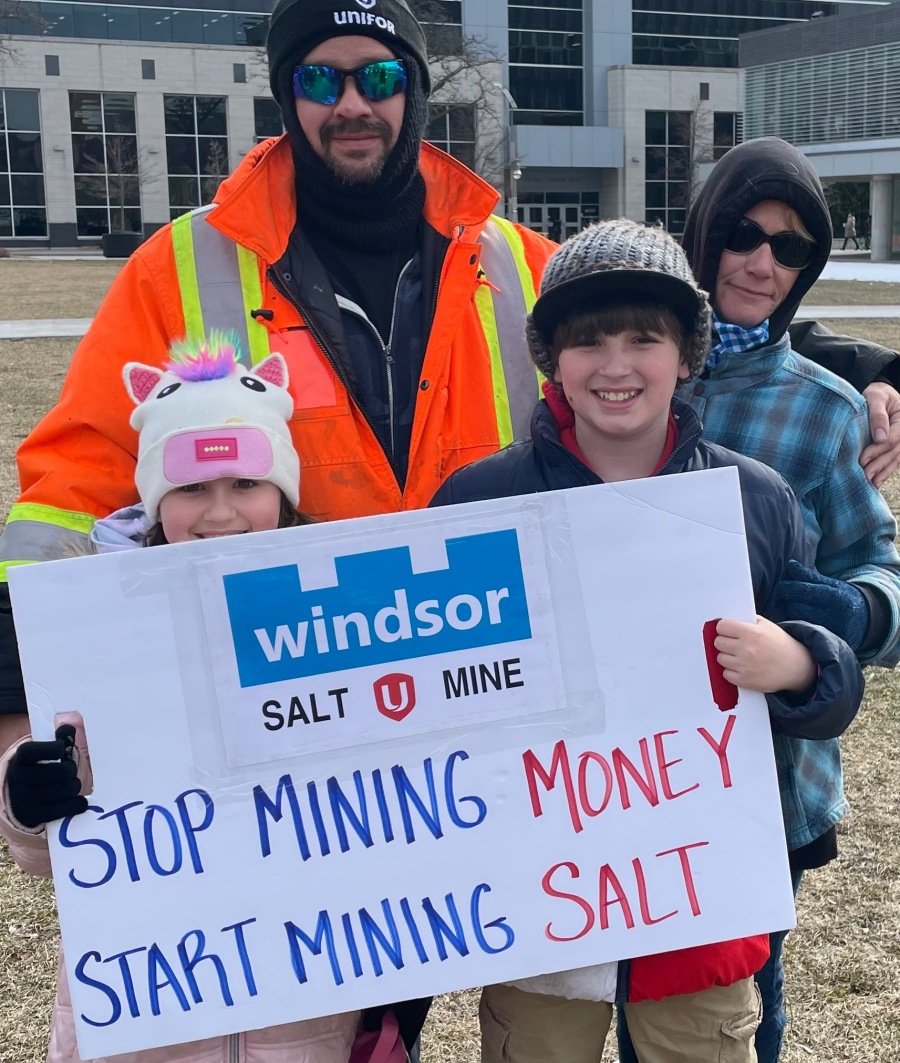July 17, 2023 - No. 37
Week 22 of Windsor Salt Strike
Salt Workers Oppose Divide-and-Rule Tactics
 Rally in support of striking salt workers, June 29, 2023
Rally in support of striking salt workers, June 29, 2023
• Talk About Neutrality in Labour Relations
• First Nations' Concerns About Windsor Salt's Mining
Leases on Their
Lands
• Windsor Salt Pays Ridiculously Paltry Rent
Week 22 of Windsor Salt Strike
Salt Workers Oppose Divide-and-Rule Tactics

Workers indicate that contract negotiations at Windsor Salt have come down to two major issues at the rock salt mine: 1) union time – meaning the company's demand that the union's ability to represent its members be weakened; and 2) job classifications and seniority to determine who is able to do what jobs. It looks like the company has not pursued its demands on these matters to the same extent, or has dropped them, in its negotiations with workers at the evaporation plant.
There are a relatively large number of job classifications at the mine compared to the evaporation facility. The workers say that the company may use that as a way to increase management rights to determine such things as who goes and who stays in the event of a layoff. For example, should the company decide to restructure the workplace by removing or merging some jobs to create new ones, management can undermine seniority as a deciding factor and determine who is retained for the new positions and who is declared “redundant.”
Besides attacking a fundamental union principle, the workers see this as a clear attempt to divide them by getting one unit to settle so that the two workplaces do not fight as one. They are having none of it. The fact is that, irrespective of their job classifications or workplaces, the salt workers have become one force during the strike and will not permit their ranks to be divided.
Prior to the strike, workers at the mine and the evaporation plant did not know one another, or much about each other's working conditions or processes of production. The strike has ended this. The workers from both operations walk each other's picket lines and have become aware of their working conditions as a whole, including the clerical and laboratory staff who work in both facilities. This is one important achievement of this strike.

"In order to encourage frank and open discussion between the workplace parties, mediators consider everything said during the mediation to be confidential. The mediation process is separate from any hearing which may result in the application. Mediators do not give their file or notes, or any documents they receive, to the Board in the event of a hearing. Parties are required to bring all their documents and witnesses to a hearing [in the situation where the mediation is related to a complaint to the Labour Board – WF Ed Note], as if the mediation had never taken place."
Given the company's ongoing attempts to impede the union's ability to function and to undermine existing seniority provisions, the workers are clear that the company has not given up its attempts to break the union. They are under no illusions that a mediator will stop the company either. They know that to date their resistance to dictate has provided a way forward and this is what is guiding them as they enter this next phase of their strike.
Talk About Neutrality in Labour Relations
The Ontario government and the Labour Relations Board and the mediators it assigns are said to be neutral to give the impression that they do not favour either side. How does this pose itself at this time? Stone Canyon Industries Holdings Inc. is showing that they need not negotiate. It is using its global monopoly on salt extraction and processing to extort the workers and the community.
Extortion
is the practice of obtaining something, especially money, through force
or threats. In this case, those engaging in extortion will accept
nothing but submission to their dictate and are using both force and
threats. They are doing everything in their power to divide, intimidate
and
pressure the workers, their families and their community as a whole.
The threat is that they could dispose of the workers and their
facilities as they did in Lindbergh. Alberta; and the force is that
they will continue to fill their orders from their other operations as
they already did to workers
in Pugwash, Nova Scotia to get them to agree to a concessionary
contract.
Using scabs at the Windsor mine and evaporation plant has almost become a moot point as the cartel just fills orders from its operations in the U.S. and other parts of Canada. This wrecking of production and attacks on workers' rights in the form of demands to weaken and even eliminate the union through contracting out is legal and permitted under existing labour law. In fact, only the workers have been made the subject of injunctions, arrest and private investigations; the company has been able to carry on with impunity.
The Ford and Trudeau governments have emboldened the company by remaining silent in the face of this attack by a foreign holding company on Ontario workers and a Canadian natural resource. When foreign cartels like those in the electric battery industry extort these same governments, they respond by handing over billions in public funds. This submission shows other cartels, like Stone Canyon, that they can do as they please and governments will act in their service.
These cartels have taken over political parties in power and the governments they form. A fiction is created to hide this, which promotes the notion that the governments are just trying to create or keep jobs. The people are then supposed to debate whether this is a good or bad policy.
The rich and the governments they have taken over see Canada, its people and territories only as an appendage of the U.S. war machine. Workers are coming to terms with the fact that their security lies only in their unity in the fight for the rights of all and in their resistance to the anti-national, anti-social, anti-worker and pro-war offensive of the rich and their governments.
First Nations' Concerns About Windsor Salt's Mining Leases on Their Lands
The Ojibway Mine complex sits on the land of the Walpole Island First Nation and the Caldwell First Nation. Both First Nations raised concerns about lease extensions for the Ojibway Mine complex in May and June 2021 but they were ignored. The fact that they raised concerns is documented by the Ontario Ministry of Mines. Stone Canyon Industries Holdings Inc. purchased Windsor Salt as part of its purchase of Morton Salt on April 30, 2021, a month before the period of the lease extension was posted and open for public comment. Both First Nations submitted questions during the public comment phase of the lease renewal process asserting their right to a say over their lands and the resources they contain. The leases were eventually renewed for 21 years on February 11, 2022 and their concerns were ignored.
 According
to government documents, "Walpole Island First Nation (WIFN) referenced
an assertion of Aboriginal title over the leased area, as claimed in
litigation commenced in 2000."[1] In that year,
Commissioners of the Indian Claims Commission, set up by the Federal
government to investigate the
validity of claims, found that the Walpole Island First Nation claim
that it never surrendered lands and waters, which include parts of the
leased lands for the Ojibway Mine complex, was valid and that whatever
Aboriginal title may have existed to what was called Bois Blanc Island
– now called
Boblo Island – in 1786 "continues to exist today."[2]
Located south of the Ambassador Bridge between Amherstburg on the
Ontario side and Detroit, Michigan, Boblo Island was for many decades
the site of an amusement park popular with people from both the U.S.
and Canada. That operation closed
in 1993 and the island was bought for $U.S.4.2 million in 1994 and is
now an island for luxury homes and golfing.
According
to government documents, "Walpole Island First Nation (WIFN) referenced
an assertion of Aboriginal title over the leased area, as claimed in
litigation commenced in 2000."[1] In that year,
Commissioners of the Indian Claims Commission, set up by the Federal
government to investigate the
validity of claims, found that the Walpole Island First Nation claim
that it never surrendered lands and waters, which include parts of the
leased lands for the Ojibway Mine complex, was valid and that whatever
Aboriginal title may have existed to what was called Bois Blanc Island
– now called
Boblo Island – in 1786 "continues to exist today."[2]
Located south of the Ambassador Bridge between Amherstburg on the
Ontario side and Detroit, Michigan, Boblo Island was for many decades
the site of an amusement park popular with people from both the U.S.
and Canada. That operation closed
in 1993 and the island was bought for $U.S.4.2 million in 1994 and is
now an island for luxury homes and golfing.
According to the Ministry of Mines, as a result of its claim of title, Walpole Island First Nation "took the position that an impact benefit agreement should be a condition of the renewed leases." According to the Ontario Human Rights Commission "Impact Benefit Agreements (IBAs) are negotiated private contracts between one or more Aboriginal governments and a resource extraction company. IBAs typically provide commitments and benefits by the resource extractor, which includes mitigating or eliminating negative impacts on Aboriginal rights, and employment, training and contracting benefits. Mining and resource development sectors are increasingly seeing IBAs as an important way to share benefits with Aboriginal Peoples whose rights would be impacted by the proposed resource development project and to mitigate impacts on Aboriginal rights."
The Ministry responded to Walpole Island First Nation's request, indicating that "the Crown's duty to consult, if triggered in the circumstances, does not require the Ministry to insist that the company enter into a commercial arrangement with WIFN, and that such commercial arrangements are not required or regulated under the Mining Act. The Ministry encouraged WIFN to contact the company directly." Walpole Island First Nation responded, "reiterating its position and asking whether the Ministry had considered whether a shorter renewal term might be appropriate and whether the renewed lease will have another renewal clause." The Ministry responded, "further discussing its position, and noting that the existing leases provide the lessee a right to renew for a twenty-one year term, and there is no option for a shorter term; and that, in respect of subsequent renewals, one of the leases is on its final term and the consultation draft for the other had a renewal clause that was more discretionary than its prior iteration."
The extension decision also indicated that "questions were also received from Caldwell First Nation (CFN) regarding the depth of the lease area and related maintenance protocols for those areas, and regarding opportunities to benefit from the project, which is located within the traditional territory of CFN and other Aboriginal communities. The Ministry acknowledged that the project is located within the traditional territory of CFN, responded to CFN's questions, and encouraged CFN to contact the company directly regarding opportunities to benefit."
It is of note that the lease itself approved by the Minister of Energy, Northern Development and Mines at the time states that the company's "rights under this Lease are subject to the protection provided for existing Aboriginal or treaty rights in section 35 of the Constitution Act, 1982 and the Lessee shall conduct itself on the demised premises in a manner consistent with the protection provided to any such rights."
Section 35 of the Constitution states:
1) The existing aboriginal and treaty rights of the aboriginal peoples of Canada are hereby recognized and affirmed.
2) In this Act, "aboriginal peoples of Canada" includes the Indian, Inuit and Métis peoples of Canada.
3) For greater certainty, in subsection (1) "treaty rights" includes rights that now exist by way of land claims agreements or may be so acquired.
4) Notwithstanding any other provision of this Act, the aboriginal and treaty rights referred to in subsection (1) are guaranteed equally to male and female persons.

The government's response -- telling the First Nations to go and speak with the company -- shows that when it comes to the use of First Nations' resources and territory it is the companies which are empowered to decide. The rights of Indigenous Peoples to a say over what happens on their lands and resources can be dismissed out of hand.
The concerns raised by the First Nations with the government raise the issue that the owners of Windsor Salt, Stone Canyon, may be operating in contempt of concerns and claims of First Nations. This should be another red flag -- on top of its union-busting activities -- for its major investors, such as the Ontario Teachers' Pension Plan.
Note
2. Walpole Island First Nation Inquiry Boblo Island Claim, Indian Claims Commission, May 2000.
Windsor Salt Pays Ridiculously Paltry Rent

Workers also report that the company gets free use of the waters of the Detroit River for its brine wells. Water under high pressure is used to extract salt.
Given the length of the strike at Windsor Salt and the time it will take to re-start production, it is possible that Windsor Salt will pay little to nothing, other than municipal and other taxes. These they can likely write off using their self-imposed losses.
(To access articles individually click on the black headline.)
Website: www.cpcml.ca Email: editor@cpcml.ca

